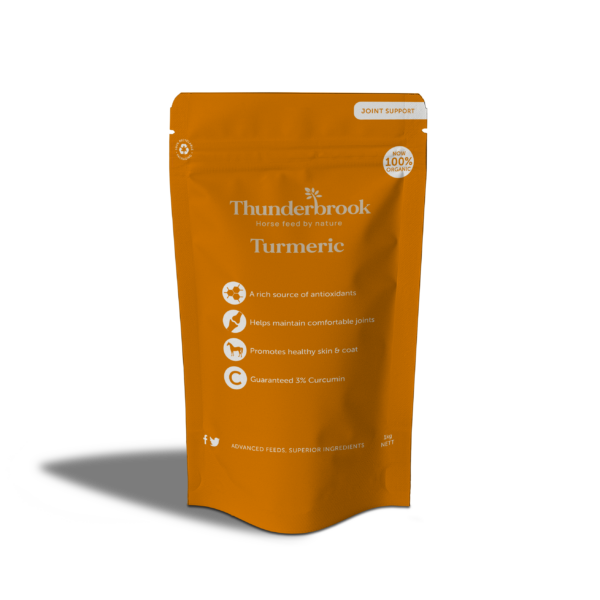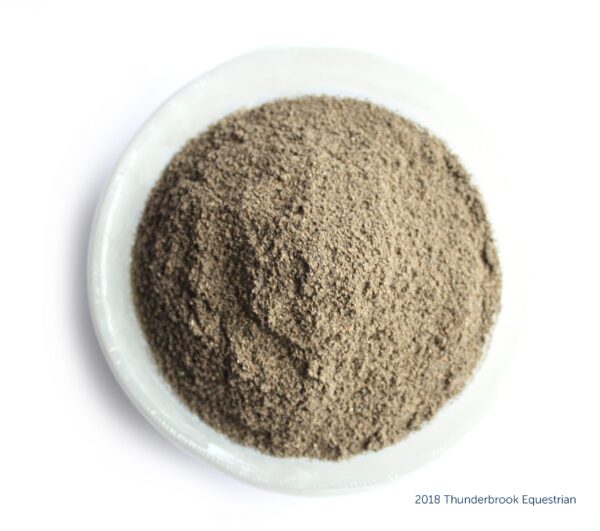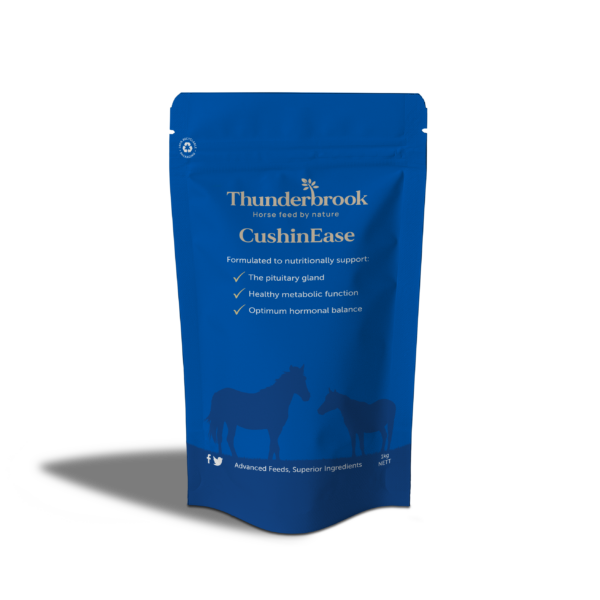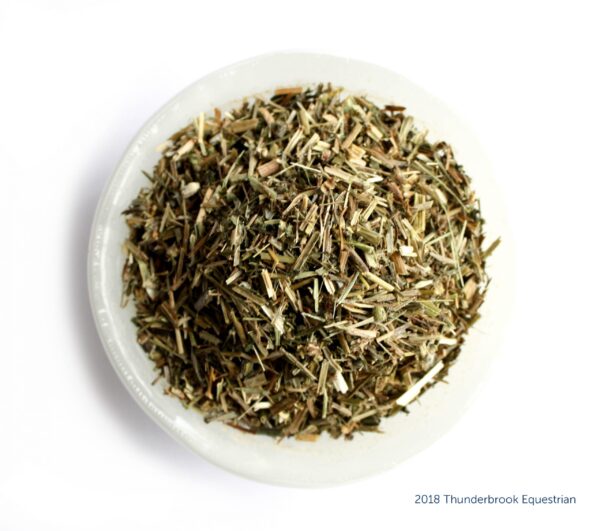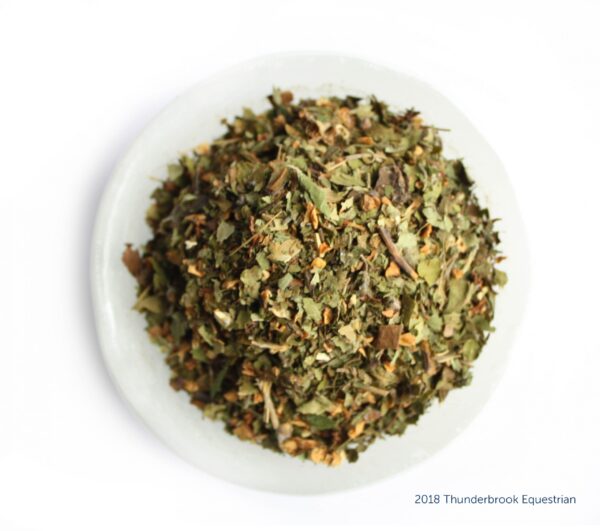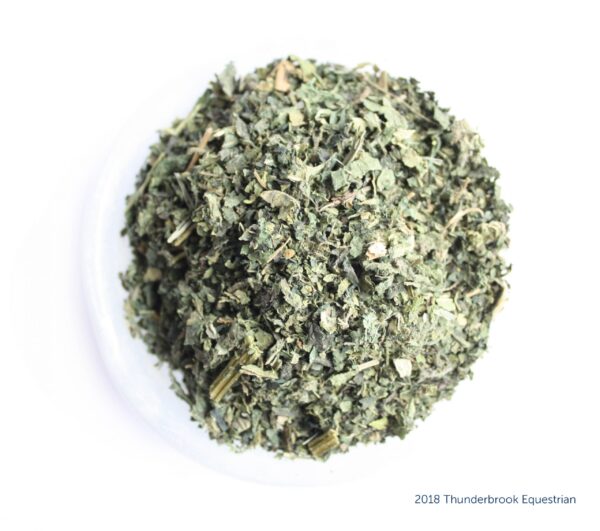Equine Cushing’s Disease, medically known as Pituitary Pars Intermedia Dysfunction (PPID), is a common endocrine disorder affecting older horses. It results from a dysfunction in the pituitary gland, leading to excessive production of adrenocorticotropic hormone (ACTH). This hormonal imbalance can contribute to a range of clinical signs, including:
- Hypertrichosis (Long, Curly Coat): A hallmark sign where the horse fails to shed their coat properly.
- Muscle Wastage and Weight Redistribution: Loss of topline and abnormal fat deposits, especially over the eyes and neck.
- Laminitis: Increased risk due to hormonal dysregulation.
- Increased Drinking and Urination: Resulting from changes in hormone levels.
- Lethargy and Immune Suppression: Horses with PPID may be more prone to infections and slow wound healing.
Nutritional Support for Horses with PPID
While veterinary management, particularly the use of pergolide (Prascend), is the standard treatment for PPID, nutrition plays a crucial role in supporting overall well-being. Thunderbrook CushinEase is specially formulated to provide natural support for the pituitary gland, metabolic health, and hormonal balance in horses affected by Cushing’s.
Key Botanicals in Thunderbrook CushinEase and Their Benefits
This supplement contains a synergistic blend of herbs and botanicals known for their beneficial properties:
Bilberry (Fruit and Leaf) (Vaccinium myrtillus):
- Antioxidant Properties: Rich in anthocyanins, bilberry exhibits strong antioxidant capabilities, neutralizing free radicals and reducing oxidative stress, which is beneficial for overall cellular health.
- Vascular Support: Bilberry has been traditionally used to support vascular health, potentially improving circulation and reducing inflammation.
Tangerine Peel (Citrus reticulata):
- Digestive Aid: Contains compounds that stimulate digestion and alleviate gastrointestinal discomfort, promoting better nutrient absorption.
- Antioxidant Activity: The peel is rich in flavonoids, contributing to its antioxidant effects, which can help mitigate oxidative stress associated with metabolic disorders.
Agnus Castus (Chaste Tree Berry) (Vitex agnus-castus):
- Hormonal Modulation: Known to influence the pituitary gland, chaste tree berry may help regulate hormonal imbalances by acting on dopamine receptors, thereby supporting normal pituitary function.
- Clinical Observations: Some studies suggest that chaste tree berry can improve clinical signs in horses with early-stage PPID, though it should not replace conventional treatments.
Hawthorn Fruit (Crataegus spp.):
- Cardiovascular Support: Traditionally used to support heart health, hawthorn may enhance cardiac function and improve circulation, which is beneficial for aging horses.
- Antioxidant Effects: Contains flavonoids and oligomeric proanthocyanidins that contribute to its antioxidant properties, supporting overall health.
Cleavers (Galium aparine):
- Lymphatic Support: Known for its diuretic and lymphatic system-supporting properties, cleavers may assist in detoxification processes and reduce edema.
Nettle (Urtica dioica):
- Nutrient-Rich: High in vitamins and minerals, including iron, calcium, and magnesium, nettle supports overall health and vitality.
- Anti-Inflammatory: Exhibits anti-inflammatory properties that can aid in managing conditions like arthritis, which may be concurrent in older horses.
Spirulina (Arthrospira platensis):
- Protein Source: A rich source of essential amino acids, supporting muscle maintenance and overall health.
- Immune Support: Contains phycocyanin, which has antioxidant and anti-inflammatory properties, bolstering the immune system.
Goat’s Rue Herb (Galega officinalis):
- Metabolic Support: Traditionally used to support insulin sensitivity and glucose metabolism, which is beneficial in managing metabolic aspects of PPID.
Cinnamon Cassia (Cinnamomum cassia):
- Blood Sugar Regulation: Contains compounds that may improve insulin sensitivity and help regulate blood glucose levels, supporting metabolic health.
Turmeric (Curcuma longa):
- Anti-Inflammatory: Curcumin, the active compound in turmeric, has potent anti-inflammatory properties, aiding in the management of inflammatory conditions.
- Antioxidant: Provides antioxidant benefits, protecting cells from oxidative damage.
Ginseng (Panax ginseng):
- Adaptogenic Properties: Helps the body adapt to stress and supports energy levels, which can be beneficial for horses dealing with chronic conditions like PPID.
Ginkgo Biloba:
- Cognitive Support: Known to enhance blood flow and possess neuroprotective properties, potentially supporting cognitive function in aging horses.
Feverfew (Tanacetum parthenium):Anti-Inflammatory:
- Anti-Inflammatory: Traditionally used to reduce inflammation and manage pain, which can be beneficial in conditions like laminitis associated with PPID.
Jiaogulan (Gynostemma pentaphyllum):
- Adaptogenic and Antioxidant: Known as “Southern Ginseng,” it supports immune function, enhances stress resistance, and provides antioxidant benefits.
Additional Nutritional Considerations for PPID Horses
- For Weight Management: Some PPID horses struggle with weight loss due to muscle atrophy. Thunderbrook Gentle Gain provides a healthy way to support weight gain without excessive starch or sugars, which can exacerbate insulin resistance.
- For Hoof Health: Since PPID horses are at higher risk for laminitis, a low-sugar, high-fibre diet is crucial. Avoid feeds with high molasses content and consider adding a hoof supplement rich in biotin, methionine, and zinc.
- For General Well-being: Feeding a balanced, high-fibre diet, along with CushinEase, can support a horse’s overall vitality

Managing PPID requires a combination of veterinary care, proper nutrition, and targeted supplementation. Thunderbrook CushinEase is a carefully formulated blend of botanicals designed to provide nutritional support for horses with PPID, helping to promote hormonal balance, metabolic health, and overall well-being. When combined with a low-sugar, high-fiber diet and Thunderbrook Gentle Gain for those needing weight support, this approach can enhance the quality of life for horses managing this condition.
By understanding the role of targeted nutrition and supplementation, owners can help their horses thrive despite the challenges of PPID.


